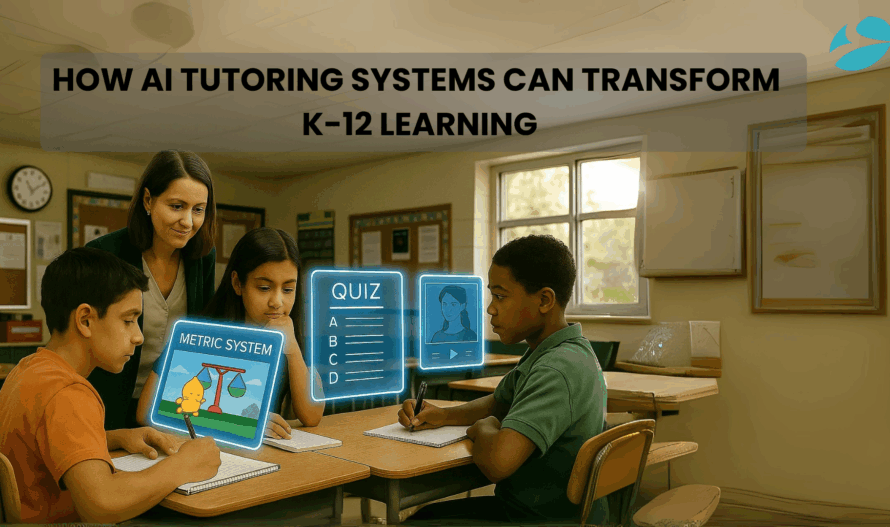How AI-Driven Personalized Tutors Are Shaping the Future of K-12 Learning
5 min read
5 min read

With smart boards, digital classrooms, and online learning resources, everyone thought that we had exhausted the limits of transforming the education sector. But at present, artificial intelligence is redefining the limits of what is possible and what isn’t.
Today, an education institution’s reputation is defined by the quality of its teaching faculty and the kind of facilities these institutions offer. Parents and educational institutions are understanding the importance of holistic education over traditional one and are supporting this transition.
In fact, according to research, the global AI market in the education sector is anticipated to reach USD 32.27 billion by 2030. Schools are investing in custom AI product development for education to make the K-12 education system more accessible. This transformative shift is led by none other than personalized AI tutors.
Now, some may question that for years, learners have thrived and achieved great heights by following the traditional system. So why is there a sudden urge to transform the education system? And the answer to that is this change has been long overdue.
The rapid pace of digital advancements necessitates this fundamental change at an early stage. It enables children to grasp knowledge as they grow into adults. This will educate the new generation on what is currently relevant.
The key catalyst of this change is the concept of personalized learning. An AI-driven intelligent teaching system enables institutions and educators to create inclusive and student-centric lessons. These tutors are available whenever students need doubt resolution or concept understanding. These tools also allow instructors ample time for lesson planning while the AI assistant assesses students’ test performance.
The traditional education system follows a one-size-fits-all approach, where, on average, one instructor is responsible for a group of learners. It only allows educators to follow standard practices that could encompass all the student groups, except that it doesn’t.
It would’ve worked in earlier days, when the group of students was smaller and there was more time at hand. However, today, every classroom has an average of 30 students, which makes it challenging to give each student the required time and attention.
Some learners require time to understand a concept, while others do not, which leads to the former group excelling in the program, while others fall behind. It also doesn’t take into account the people with disabilities or those who require special accommodations.
The traditional system also hinders an instructor’s productivity while they juggle class lessons, assessments, administrative work, and other duties. All the tasks often lead to burnout and don’t leave much scope for building one-on-one connections with students.
The school superintendents often ask, Can AI product development for education help resolve the issues with traditional learning practices?
The question comes up due to a massive shift from manual to AI-assisted processes, which is understandable. But, according to experts at BiztechCS, an AI-powered solution addresses the problems mentioned above and more to enhance the process with intelligent resources.
Some of the reasons why AI product development for education is beneficial:
Benefits aside, AI solution integration can get very expensive and complicated if not handled well, which leads us to another question, “How to integrate AI tutors into existing schools and curriculum without disruption? How to train the teaching staff and ensure favorable AI adoption?”
The answer is through a systematic and gradual approach. A phased implementation will ensure that everyone is informed throughout the development process. The practice will also simplify integration, educator training, curriculum alignment, and adaptation.
One way to achieve this is to collaborate with a highly rated AI engineering company. At BiztechCS, we help our clients enhance their education institute workflow with resilient AI solutions.
As an experienced AI engineering company, we can implement a comprehensive development strategy for creating personalized AI tutoring solutions. This systematic approach ensures robust, scalable, and educationally effective platforms.
When collaborating with an educational institution, we try to understand the varied nuances. These conditions include, but are not limited to, curriculum accuracy, data privacy, and proper understanding of cultural aspects to cater to the diversity within the group.

The AI product development for education begins with thorough research into specific requirements. Our team initiates consultations with stakeholders to understand the unique challenges and opportunities. This phase involves analyzing current curriculum standards, identifying learning gaps, and understanding the technological infrastructure available in the institutions.
It is essential to understand the current digital infrastructure and its capabilities. Ensure that your IT team is well-prepared with documented data on technical aspects and performance reports before the assessment. This establishes a baseline for further assessments and planning, enabling the development team to determine accurate costs and development timelines.
After the assessment, the development team designs a comprehensive AI architecture that supports personalized learning. This involves selecting appropriate machine learning algorithms, natural language processing capabilities, and adaptive learning frameworks.
This is the stage where the AI architecture is finalized as one consolidated solution. Adopting a containerized microservice architecture would be an advantageous move. It enables individual components to operate and update independently without system downtime. To go a step further, you can also integrate API documentation to reduce vendor dependency.
We understand that AI product development for education requires careful consideration. Our team secures the AI tool through robust data governance frameworks that comply with educational privacy regulations such as FERPA and COPPA. This creates secure data collection channels, establishes anonymization protocols, and creates transparent data usage policies.
Project Manager Tip: Employ end-to-end encryption for all student data transmission and storage. You can also implement role-based selective access control and multi-factor authentication for added security. Our team also suggests adding data anonymization using irreversible hashing techniques to prevent data leaks or unauthorized access.
This step involves integrating AI solutions with existing educational content and curriculum standards. Our team will carefully design a personalized learning experience that adheres to the required state and national educational standards. This includes creating interactive exercises, assessments, and multimedia content that engages students across different learning preferences.
Integrating SCORM 2004 and xAPI compliance secures the migration of educational content between different learning management systems. You can also request metadata tagging to map the content in relation to specific learning objectives.
Creating intuitive interfaces for both students and educators is crucial for the successful adoption of learning tools. Our team is capable of designing user-friendly dashboards that provide clear insights into learning progress, areas of improvement, and achievement milestones.
Keep the teachers and students informed when designing the UI/UX of the AI tutor. This is because they will be using it regularly and their input will ensure a streamlined learning and teaching process.
Developing effective AI tutors requires sophisticated machine learning models trained on educational data. BiztechCS can implement adaptive learning algorithms that continuously improve based on student interactions and learning outcomes.
Project Manager Tip: It is advised to add advanced custom functionalities, like progress trackers, predictive analytics, and recommendation engines. Doing so further simplifies assessments and follow-ups for students.
Before full-scale implementation, comprehensive testing ensures the AI tutoring system functions effectively across different scenarios. Our team conducts beta testing with select educational institutions, gathering feedback from teachers and students to refine the system’s functionality and user experience.
The best practice is to implement beta testing across multiple scenarios, including challenging ones. This will help identify opportunities for improvement and deliver an exceptional AI-powered solution. Ask the AI engineering company you partner with to follow this approach for best results.
The final step involves full deployment accompanied by comprehensive training programs for educators and technical support systems. BiztechCS can provide ongoing maintenance, updates, and improvements based on user feedback and evolving educational needs.
A gradual rollout of AI assistants is a preferable approach, as it allows both teachers and students to become accustomed to the new workflow. This minimizes disruption, yielding favorable results.
Do you want to explore how a custom, curriculum-aligned AI tutor can transform learning in your school or district? Let’s discuss how we can translate your goals into a premium-quality AI solution.
Many educational institutions have already started the transformation journey with AI-powered tutors. To name some of them:
Khan Academy has developed Khanmigo, an AI-powered tutoring assistant that provides personalized learning experiences across multiple subjects. This platform utilizes GPT-4 technology to provide conversational tutoring, homework assistance, and writing support. Khanmigo guides students through problem-solving processes while encouraging critical thinking rather than simply providing answers.
Squirrel AI represents one of the most advanced adaptive learning systems globally. It uses sophisticated algorithms to create personalized learning paths for students. The platform can precisely identify knowledge gaps and adapt instruction in real-time based on student responses and learning patterns.
MATHia focuses specifically on mathematics education, providing AI-powered personalized instruction that adapts to individual student needs. The platform combines cognitive science research with artificial intelligence to create learning experiences that mirror one-on-one human tutoring sessions.
Cognii offers conversational AI tutoring that engages students in natural language interactions. The platform evaluates student understanding through open-ended questions and provides personalized feedback across various subjects. Its strength lies in developing critical thinking and communication skills alongside academic content mastery.
Century Tech provides AI-powered learning platforms that combine personalized learning paths with comprehensive analytics for educators. The system can identify learning gaps and track progress across multiple subjects, making it valuable for schools seeking comprehensive AI integration.
Now, some might wonder, “If there are so many AI tutors available in the market, then why should one invest in custom AI product development for education? Won’t it be beneficial to integrate one of the off-the-shelf options?”
While an off-the-shelf AI platform offers a multitude of functionalities, a custom solution will cater to an institution’s unique requirements. Custom AI tutoring systems can align perfectly with institutional curricula, teaching methodologies, and assessment frameworks.
Additionally, custom solutions provide complete data ownership and control, allowing educational institutions to maintain privacy and security standards that meet their specific requirements.
The transformation of K-12 education embodies the promise of individualized learning for every student. Educational institutions are identifying the limitations of current teaching methods, which is further accelerating the push towards AI-assisted learning.
AI product development for education presents unprecedented opportunities to address longstanding educational challenges. The advancements create new possibilities for student engagement, teacher empowerment, and learning effectiveness.
BiztechCS’s comprehensive approach to AI tutoring system development ensures that educational institutions receive solutions tailored to their specific needs. With the rise in demand for AI integrations, the question is not about what AI can transform, but how quickly institutions adapt to this evolving landscape.
One thing to remember is that these AI tools are the assistants that enhance the way a teacher imparts knowledge to their students. These solutions are not their replacements and shouldn’t be considered such.
The future of education is personalized, adaptive, and powered by artificial intelligence. Institutions that embrace this transformation will create an unparalleled learning environment for their students.
Want to explore how AI can transform the K-12 education system in your institution? Let BiztechCS help you roadmap every step of this transformative process.

Artificial Intelligence (AI)
30
By Nandeep Barochiya

Artificial Intelligence (AI)
263
By Nandeep Barochiya

Odoo
134
By Uttam Jain